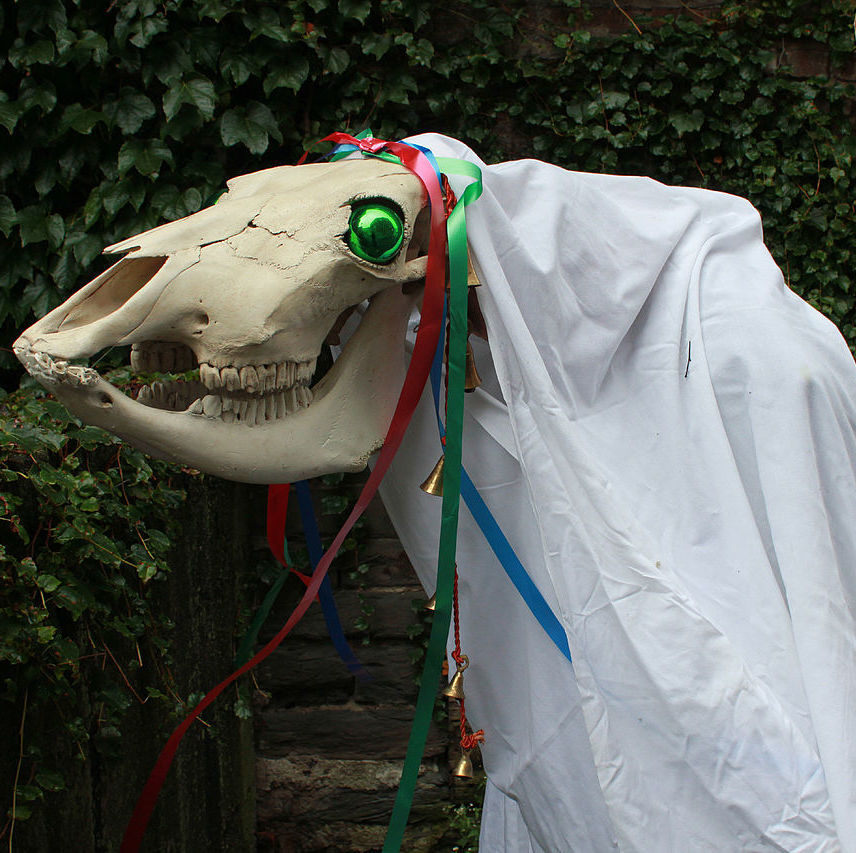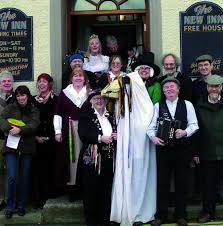
09 Dec 2020 Mari Lwyd haunts the season
In the bleak Welsh midwinter, kicking a gift horse named Mari Lwyd may cost you a song and a mince pie!

Around Christmas and New Year’s, a knock on the door may not be UPS, but Mari Lwyd, a floating h0rse skull adorned with ribbons and bells shrouded by a white sheet. Paraded around villages by a herd of humans, the pagan origins of Mari Lwyd, or Grey Mare dates back three thousand years in Celtic mythology.
The custom first recorded in 1800, a group of male crooners requests entry to a house only to be denied entry. A round-robin of call and response ensues until a house owner relents. The practice combines mythology with a centuries-0ld tradition of wassailing. The word wassail, 0riginally interpreted as ‘be in health,’ came to represent a boozy drink of sugared and spiced ale. Wassailing as a practice evolved to represent poor merrymakers begging for booze from wealthy neighbors in December.
Mari Lwyd purports to cross between this w0rld and the underworld but claims roots in South Wales. An offshoot of wassailing door to door, herd members or celebrants try to earn food and drink from house occupants after singing a robust round of Welsh folk songs, trying to entice a response in kind.
 No longer a class-based effort, modern-day revelers are neither poor nor driven by the warmer tastes of the season but reboot a slice of Welsh history with their community. Both male and female wassailers sing and entertain, hoping to earn an invitation to imbibe in traditional cakes and ale once a door opens. In a communal event, villagers come together to decorate Mari Lywd and proudly march her around darkened streets, visiting families and businesses door to door.
No longer a class-based effort, modern-day revelers are neither poor nor driven by the warmer tastes of the season but reboot a slice of Welsh history with their community. Both male and female wassailers sing and entertain, hoping to earn an invitation to imbibe in traditional cakes and ale once a door opens. In a communal event, villagers come together to decorate Mari Lywd and proudly march her around darkened streets, visiting families and businesses door to door.
Mari Lwyd nearly disappeared from Wales due in part to the influences of the Christian clergy. Indeed, the Catholic Church’s key leaders laid claim to Mari Lwyd as Blessed Mary though the tradition predated Christianity.
The custom sputtered in the 20th century, perhaps due to religious influence or a change in social mores, but re-emerged in the mountainous parts of Wales as a means to reassert cultural identity. Suffering from the fragmentation of traditional industries, the reemergence of Mari Lwyd was a revival of Welsh patriotism and self-respect.
The following video, spoken entirely in Welsh and filmed by the BBC in 1966, gives a flavor to this longstanding tradition.
Repeated call and response exchanges in the song frustrate the Mari Lwyd and result in a ritual called pwnco, an exchange of rude rhymes and lyrics meant to pressure the person who lives in the house to relent. Mari Lwyd, though considered to bring good luck to the household, mayhem ensues with attempts to steal items and chase people around the room once gaining entry. Be prepared to exercise your vocal cords if you hear a knock at your door this holiday season and invite Mari Lywd into your home with good cheer.

